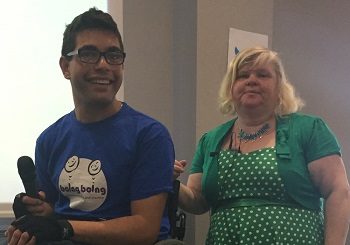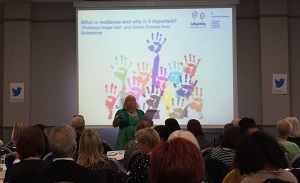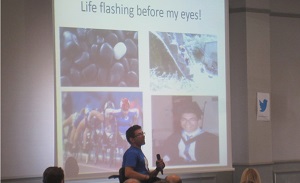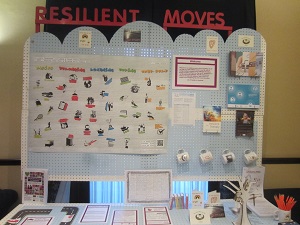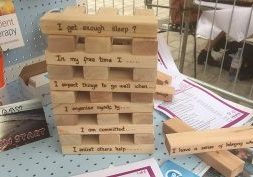Boingboing blogs from… Leeds
The MindMate Resilience Conference, 6 October 2016, Leeds
by Gabrielle Rowles, Boingboinger
Excitement built as we pulled out of the morning rush hour traffic, heading for Leeds, to find a parking space in Elland Road football stadium. I’ve frequently imagined this venue over the years, home to a team who liked to kick lumps out of my champions, Chelsea, in the 70s. The walls were covered in photographs and memorabilia from this era, but like one of those anxiety-fuelled nightmares, no matter how many rooms and staircases I explored to find the pitch, I came up against brick walls and padlocked gates.
Luckily, I wasn’t there to watch a match. Boingboing had been invited by Leeds Council to organise an exploration of resilience practice alongside MindMate Resilience, which is based in Leeds. We were expecting up to 200 delegates involved in front-line services, such as education and youth work, and Scott had devoted three heroic hours the previous evening, to constructing our pop-up shop. He knows how to use a screwdriver, that man. It looked brilliant.
As people began to arrive, they met up with old colleagues and people they rarely met face-to-face and a babble of chatter rose up. Just having the chance to meet and relax was clearly a bonus for these dedicated professionals. Then our own prof, Angie Hart, opened up the day with a presentation on ‘Resilience: Why Bother?’ Being Angie, she soon had everyone in stitches, particularly when she attempted to get the audience to sing a resilience-based football chant, and also asked if there were any twits in the room (we had a Twitter hashtag for the day and tweeting is something I’m hoping to get to grips with using in the coming weeks). This opening allowed everyone to relax and enjoy the day, away from their intense working patterns, wrestling with serious issues around mental health and it reinforced the idea that one of the ways to support resilience is to have a laugh.
Angie introduced resilience and how it fits into local and national strategies around mental health and wellbeing, and Simon also shared the platform to give a more personal account of resilience. He immediately had the audience laughing when he congratulated Claire Stubbs, who had managed to solve a microphone issue, for ‘giving the disabled a voice.’ He continued by explaining the mechanisms which have supported his resilience throughout his life and really kept people amused, as well as inspired, by his story so far. Angie tried to capture the opinions of participants who wanted to share, by walking around the hall and leaning in, with the mic on her dress close to their mouths. It seemed to startle them, initially, until she explained what she was doing and caused even more joviality.
This was followed by Dr Susan Ritchie, who is a senior Educational Psychologist and part of the team trying to ‘Make Leeds a child-friendly city’, with a talk about Leeds Local Offer. Her focus was particularly on considering the social and emotional mental health needs which impact on children’s behaviour, rather than labelling them as having a behavioural disorder. Duncan Millard then discussed MindMate Families, a course available for parents in Leeds, which aims to give families the skills to improve their children’s emotional resilience. Despite the fact that it was clear that, in a deeply unequal society, many families are experiencing enormous pressures, the talks combined to demonstrate how much excellent work is going on to support people, and the dedication of workers in Leeds to supporting their children and young adults. Above all, we were reminded to remember the power of simple strategies and small changes to have a life-long impact.
After coffee, delegates attended different workshops and Scott and I raced to the pop-up shop to make sure we could explain all Boingboing’s different co-produced games, books and other products that celebrate resilience. There was a lot of interest, especially in the Sun and Clouds game and the Resilience Tower, and people were phoning their managers to check budgets – which was a good sign and made all Scott’s efforts seem worthwhile. In the meantime, Angie’s workshop on Practitioner Resilience had the unexpected outcome of inspiring a participant to go out and find a fun-loving partner, in her case a husband, in order to support her resilience.
After lunch, Michelle Scally Clarke gave a performance in which she played the part of Molly, a young woman experiencing mental illness. She uses this piece in schools to raise awareness of the issue and encourage young people with mental illness to feel less isolated. Lisa Williams, from YoungMinds, followed up with an appraisal of Resilience and Mental Health Systems, reinforcing the government’s conclusions from Future in Mind (2015), that a whole system approach is needed across the UK. Nevertheless, she said, it is interesting to note that in the system around a child, from family and friends and schools out to specialist services, the structures that a child is most likely to access are those which they encounter every day. Although expert services such as CAHMS are perceived to be difficult to access, Lisa reminded us that those in more direct contact with children can reinforce resilience early, to prevent children from needing access to CAHMS.
After more workshops, Angie invited the entire group to reflect on everything they had learned and consider some practical action they can put in place. The fact that people didn’t sneak off home, avoiding the concluding talk, made us think it had really been a positive experience for everyone, and hopefully a day which will impact, not only on their practice, but also on their own resilience and sense of hope about what they are trying to do.
Scott, Simon and I set about deconstructing the pop-up shop, which was considerably easier with more hands, with gravity on our side, and with the discovery of a button on the side of the screwdriver which meant we didn’t have to keep taking it out to turn it. You learn something new every day…
